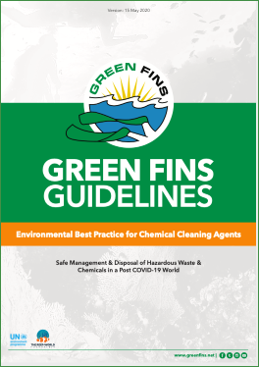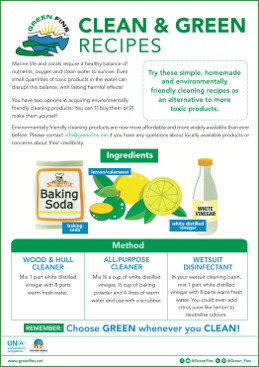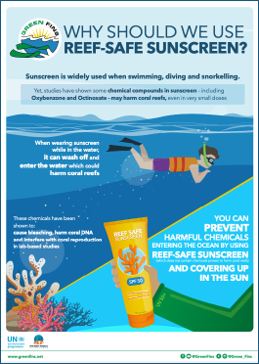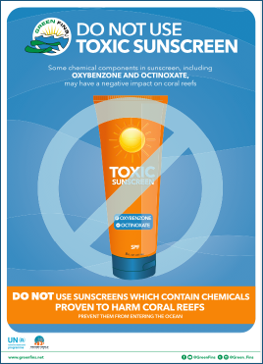Grow Business Productivity Through Better Environmental Practices
Overview of Reef-World’s session at DEMA 2020
Introduction
The demand for sustainable travel and adventure is growing. NOAA’s Office of National Marine Sanctuaries and The Reef-World Foundation are working together to bring you the latest intel in increasing your marketability while integrating environmental sustainability within your business. This session will draw on the 20+ years’ experience of United Nations Environmental Programme (UNEP) and Reef-World’s internationally operational Green Fins initiative and NOAA Sanctuaries’ Blue Star Program - sharing lessons learned and showcasing successes. You’ll learn from the leaders and industry participants on how to increase your bottom line while supporting environmental stewardship practices. Your business and your customers will enjoy the benefits that come from lower environmental impact operations which include healthier marine life, higher retainment of staff and increased return customers. In addition, your business will be given a voice to support plans to shape the future of sustainable diving programs in US based National Marine Sanctuaries.
Meet the hosts
Chloe Harvey, The Reef-World Foundation
A passionate scuba diver and marine biologist. As a Director at The Reef-World Foundation, Chloe is leading the charity’s global Green Fins initiative. Through Green Fins, the charity is driving sustainable practices across the diving and snorkelling industry.
Marlies Tumolo, NOAA National Marine Sanctuaries
Marlies coordinates the Blue Star Diving Programme, Goal: Clean Seas Florida Keys, and the Florida Ocean Guardian School Program. Marlies is a certified NOAA diver who loves exploring the ocean and sharing her excitement for the marine world with those around her.
Session highlights
Marlies
My name is Marlies Tumolo and I work for the Florida Keys National Marine Sanctuary. We have a couple of specific goals for today’s presentation. One is for folks to be able to learn actionable solutions to building business resilience and profitability while also implementing environmental options. Another is to share free resources and tools to assist you in this journey as you move forward in implementing green best practices.
First we're going to talk a little bit about the Blue Star and Green Fins programmes. Next, we're going to discuss the consumer shift to sustainability and what we call the sustainability pathway. We have two fantastic dive operators with us here today who will provide some case studies about how they implemented these in their business. And then we have some tools that will be available for you to use in your own organisation.
Photo by Kathleen Ng (@KatGeo.Dive) of Bubbles Dive Centre
We at the Florida Keys National Marine Sanctuary is part of a system of national marine sanctuaries around the country. These are marine protected areas managed by NOAA, the National Oceanic and Atmospheric Administration, and we protect more than 620,000 square miles of ocean and Great Lakes waters. Just to give you an idea of what that actually looks like, that's bigger than the state of Alaska!
I specifically work with the Florida Keys National Marine Sanctuary. This marine sanctuary is off the southern coast of Florida in the United States surrounding the island chain of the Florida Keys. If you visit the Florida Keys and you dip your toes in the water, you’re in the Florida Keys National Marine Sanctuary. Our mandate is resource protection. With that in mind, we created a voluntary recognition programme called the Blue Star programme. This programme was established with the goal of reducing impacts of divers, snorkellers and anglers on the ecosystems of the Florida Keys. The Blue Star programme salutes charter boat operators who promote responsible and sustainable diving and fishing practices, helping to keep the ecosystem healthy for generations to come.
Many of the tools and actions we’ll discuss today are implemented by our Blue Star operators with the goal of having a more sustainable business. So, we encourage you if you come to Florida Keys to look before you book and seek out a Blue Star operator. With that, I'm going to pass over to Chloe.
Chloe
I'm Chloe Harvey and I'm a professional scuba diver. I've been diving for over 25 years but I'm also a marine biologist and I've been working with The Reef-World Foundation for over 10 years now. The Reef-World Foundation is a UK registered charity which delivers practical solutions for marine conservation around the world. Our main programme is Green Fins, which we run in partnership with the United Nations Environment Programme.
Photo by Kathleen Ng (@KatGeo.Dive) of Bubbles Dive Centre
Green Fins covers four main aspects. Firstly, the Code of Conduct is 15 actions and activities that dive centres can follow to reduce their negative impact on the marine environment above and below the water. Secondly, a robust assessment system to measure and monitor compliance to the Code of Conduct. Thirdly, outreach and capacity building among dive centres, the wider diving industry and governments. Fourthly, where it's necessary, the strengthening of regulatory frameworks. The Green Fins programme has been developed by divers since 2004 to influence core businesses. It started off in Thailand and spread across Southeast Asia; more recently coming to the Caribbean and Egypt’s Red Sea. We work with over 600 dive centres around the world.
Sustainability is really going mainstream. More than ever, as the world suffers from the effects of this pandemic, customers are looking for products and services that align with their values that make them feel safe. They need to trust your offerings and sustainability is seen as a key indicator for that. Data from Sustainable Travel International shows that more than half of US markets are selecting their travel company based on sustainability practices. This is too big to ignore. Furthermore, a survey done by Booking.com showed 87% of travellers want more sustainable travel options. ZuBlu, an online dive holiday booking company, saw that 73% of travellers have trouble finding the best eco friendly options. So, we want dive centres to shout about what they're doing for sustainability.
We know the millennial market is focused on sustainability. This is going to grow and become a bigger deal in years to come. Governments and industry are also starting to focus on sustainable tourism campaigns to be able to access this green growing tourism market. Sustainability gives businesses new opportunities, new customers, a compelling mission, new fresh staff, but it needs to be more than handing out reusable bottles. It needs to become part of your business model.
I'd like to move on to the Golden Circle model by Simon Sinek and give a shout out to Lori Wilson from Blue Ocean Network for putting me onto this concept. Traditional businesses start with ‘the what’ (this is what we do - we take you on scuba diving trips), then ‘the how’ (this is how we do it - we're located close very nice reefs) and then ‘the why’ (this is why we do it - we’re divers that love diving). A sustainable mindset flips this around and starts right at the centre: we’re divers who love the ocean and want to protect it. Then the how: as diving has become more popular in our area, the reef has declined so we decided to review our own policies to make sure we're not contributing to that. And then the what: our services are underpinned by sustainability and our customers come to us because they know we put the environment first.
This Golden Circle model works much like a pebble being dropped in a pond. The positive mindset expands outwards and impacts more and more people in its wake. Customers really want to know your story. They want to know your ‘why’ before they give you their time and their money. They don't want to be treated as a consumer group because they treasure their individuality and they expect you to do the same. They don't want to be targeted. They like to interact with brands and feel that personal touch. If you lie and greenwash, they will tell their friends and social media networks not to trust you. These days, trust is a much more valuable commodity than money.
Now, let's give you some tips on how to build sustainability into your why. Unfortunately, it's not as quick as clicking your fingers; it is a process. We've developed a sustainability pathway over 16 years working with more than 600 dive centres through Green Fins.
-
Step one represents the awakening. This is the awareness of the need to change. If this journey is going to be successful, the decision to shift to sustainability must come from the top down. It can't be led by staff; it needs to come from management.
-
Step two is tackling some low hanging fruits. This could include reducing single-use plastics in your operation. These challenges are typically low financial investments but they're accompanied by a gentle but credible internal shift in philosophy.
-
Step three navigates through some bigger steps which often require more investment. This could include changing suppliers to more eco conscious suppliers or it could include changing boat engines to more environmentally friendly options or switching to renewable energies.
-
By step four, the business begins to embody sustainability with its ethos and real benefits start to emerge: new opportunities and collaborations such as working with local governments on environmental projects. At this point, staff choose to work with you because of your values and are happy to carry your message day in day out. They will stay with you for longer. Your customers become your leading marketing tool through word of mouth and return visits.
-
By step five, sustainability is your mission. It's your why. It's the reason your business exists and succeeds. By this point, you’re enjoying many benefits such as brand loyalty.
If you'd like some inspiration of brands that are well and truly on the sustainability pathway, look at two of our partners: Fourth Element and Paralenz. These companies have put sustainability at the heart of their business models.
















